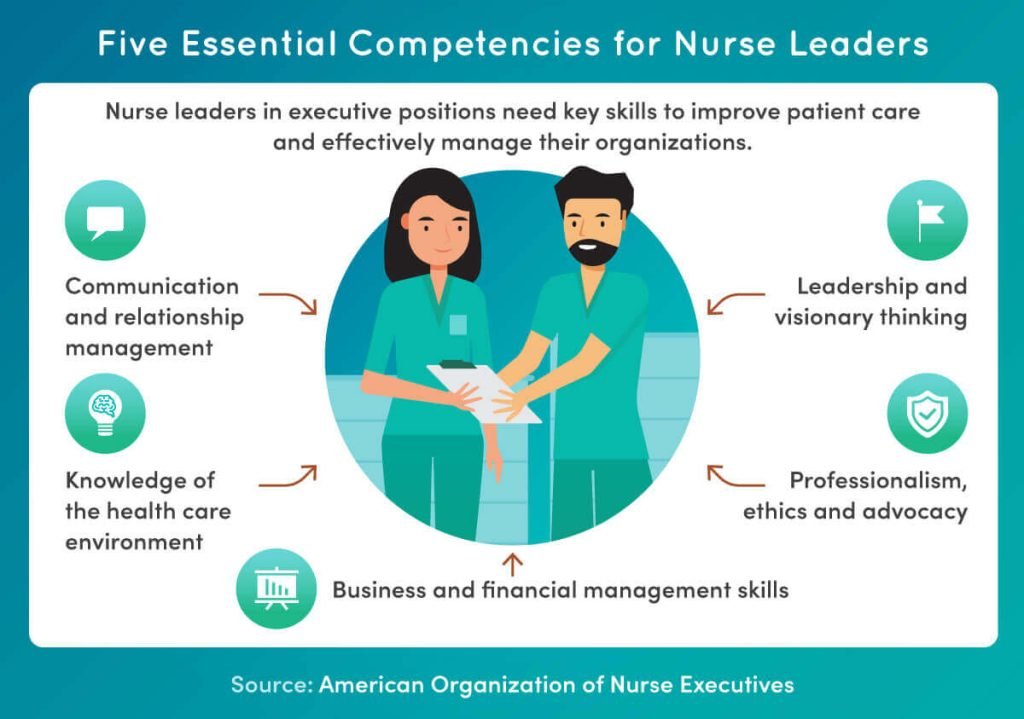
Leadership and management are essential components of the nursing profession. Effective nursing leadership and management play a vital role in the success of healthcare organizations. The nursing profession has evolved over the years, and nursing leadership and management courses have become more critical than ever before. This article will discuss the curriculum and competencies of nursing leadership and management courses.
Curriculum of Nursing Leadership and Management Courses
The curriculum of nursing leadership and management courses is designed to prepare nurses to become leaders and managers in healthcare organizations. These courses cover a broad range of topics that are essential for effective leadership and management. The following are the key components of the curriculum for nursing leadership and management courses:
- Leadership Theories and Principles
Leadership theories and principles are an essential component of nursing leadership and management courses. These courses cover various leadership styles, including transformational, transactional, and servant leadership. Students learn how to apply these theories and principles to improve patient outcomes and the overall performance of healthcare organizations.
- Organizational Behavior and Management
Organizational behavior and management courses provide students with a deep understanding of how healthcare organizations function. Students learn about the different departments and their roles, the structure of the organization, and the factors that influence organizational behavior. This knowledge is essential for nurses to be effective leaders and managers in healthcare organizations.
- Healthcare Financial Management
Healthcare financial management is a crucial component of nursing leadership and management courses. Students learn about financial management principles and practices, including budgeting, accounting, and financial reporting. They also learn how to analyze financial data and make informed decisions based on that data.
- Healthcare Quality and Safety
Healthcare quality and safety courses cover the principles and practices of quality improvement and patient safety. Students learn how to identify and mitigate risks, how to develop and implement quality improvement initiatives, and how to measure and evaluate the effectiveness of those initiatives.
- Healthcare Information Technology
Healthcare information technology courses provide students with an understanding of the role of technology in healthcare organizations. Students learn about electronic health records, telehealth, and other technological advancements in healthcare. This knowledge is essential for nurses to be effective leaders and managers in healthcare organizations.
- Human Resource Management
Human resource management courses cover the principles and practices of managing healthcare personnel. Students learn about recruitment, retention, and employee engagement. They also learn about labor laws, regulations, and policies that affect healthcare organizations.
- Healthcare Policy and Advocacy
Healthcare policy and advocacy courses cover the principles and practices of healthcare policy development and advocacy. Students learn how to analyze healthcare policies and how to advocate for policies that improve patient outcomes and the overall performance of healthcare organizations.
Competencies of Nursing Leadership and Management Courses
Nursing leadership and management courses aim to develop a set of competencies that are essential for effective leadership and management in healthcare organizations. The following are the key competencies of nursing leadership and management courses:
- Critical Thinking and Problem-Solving
Critical thinking and problem-solving are essential competencies for nursing leadership and management. Effective leaders and managers must be able to identify problems, analyze data, and develop solutions based on that data. These competencies are critical for improving patient outcomes and the overall performance of healthcare organizations.
- Communication and Interpersonal Skills
Communication and interpersonal skills are essential competencies for nursing leadership and management. Effective leaders and managers must be able to communicate effectively with patients, families, and other healthcare professionals. They must also be able to build relationships with their team members and other stakeholders in the organization.
- Leadership and Teamwork
Leadership and teamwork are essential competencies for nursing leadership and management. Effective leaders must be able to inspire and motivate their team members, develop a shared vision, and work collaboratively to achieve that vision. These competencies are critical for improving patient outcomes and the overall performance of healthcare organizations.
- Ethical and Professional Practice
Ethical and professional practice is an essential competency for nursing leadership and management. Effective leaders and managers must adhere to ethical and professional standards, including the nursing code of ethics. They must also promote a culture of ethical and professional practice within the organization.
- Strategic Planning and Decision-Making
Strategic planning and decision-making are essential competencies for nursing leadership and management. Effective leaders and managers must be able to develop and implement strategic plans that align with the organization’s mission and goals. They must also be able to make informed decisions based on data and evidence.
- Change Management
Change management is an essential competency for nursing leadership and management. Effective leaders and managers must be able to lead and manage change initiatives in healthcare organizations. They must be able to communicate effectively with stakeholders, manage resistance to change, and ensure that change initiatives are implemented successfully.
- Cultural Competence and Diversity
Cultural competence and diversity are essential competencies for nursing leadership and management. Effective leaders and managers must be able to work with diverse patient populations and staff members. They must also promote a culture of inclusion within the organization.
Conclusion
Nursing leadership and management courses play a vital role in preparing nurses to become effective leaders and managers in healthcare organizations. The curriculum of these courses covers a broad range of topics that are essential for effective leadership and management. The competencies developed through these courses are critical for improving patient outcomes and the overall performance of healthcare organizations. As the nursing profession continues to evolve, nursing leadership and management courses will become even more critical for the success of healthcare organizations.
COURSES & COMPETENCIES
Find online help in writing essays, research papers, term papers, reports, movie reviews, annotated bibliographies, speeches/presentations, projects, presentations, dissertation services, theses, research proposals, essay editing, proofreading, Book reviews, article reviews, formatting, personal statements, admission essays, scholarship essays, application papers, among others.


 WRITE MY ESSAY NOW!
WRITE MY ESSAY NOW!